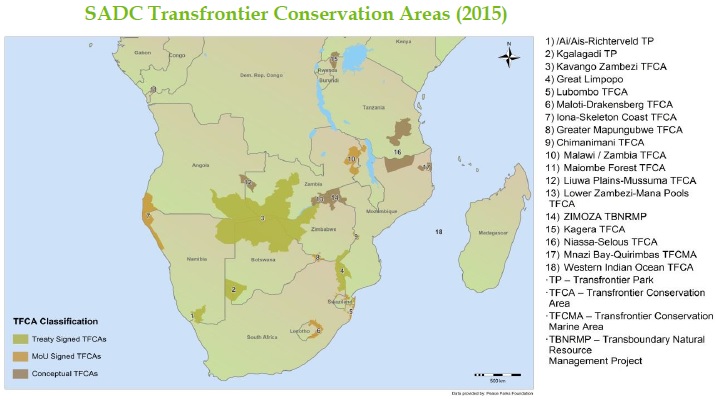News
Transboundary use and protection of natural resources in the SADC-region

Introduction
The region of the Southern African Development Community (SADC) is rich in natural resources. Over 50 per cent of the GDP in the Member States is earned from the primary sector (agriculture, mining and forestry) and most of the rural communities are directly dependent on natural resources to secure their livelihoods. With its unique wildlife and natural beauty, the region attracts millions of tourists every year, providing direct and indirect income opportunities for many people.
However, natural ecosystems and their services are under increasing pressure from population growth, the expansion of farmland, growing demand for energy, infrastructure development and the impact of climate change. The deforestation rate in the SADC region is currently the highest in Africa. Poaching is on the rise again, even in conservation areas. Fires set to clear land frequently get out of control and emit large amounts of greenhouse gas.
The SADC Member States established the Food, Agriculture and Natural Resources (FANR) Directorate in 2004 to tackle these challenges and to make sure that cross-border management of natural resources contributes to poverty reduction, peace keeping and regional integration. The 15 Member States of the SADC have agreed on policy documents, strategies and frameworks which address the degradation of natural resources – such as the Protocol on Wildlife Conservation and Law Enforcement and the Protocol on Forestry. Implementation of these agreements is key to ensuring the sustainable protection and use of the region’s abundant and diverse natural resources.
The overall objective of the Trans-boundary use and protection of natural resources in the SADC-Region programme is to ensure that the regional and national actors improve the implementation of SADC protocols and strategies for sustainable natural resource management. GIZ is contributing to the implementation of the following three regional programmes:
-
Trans-frontier Conservation Areas (TFCA)
-
Regional Cross-border Fire Management
-
Reducing Emissions from Deforestation and Forest Degradation (REDD).
On the basis of pilot activities the project introduces innovative methods and concepts in selected TFCAs that address cross-border fire management, income generation through natural resource management and tourism, climate change adaptation and HIV/AIDS prevention. Training tailored to the specific needs is provided to back up all activities.
The project advises the SADC Secretariat on policy and concept development by drawing up and monitoring guidelines and standards, designing innovative financing mechanisms and identifying and disseminating best practices. At TFCA level, it assesses and selects best practices in pilot projects on cross-border management and supports networking among TFCA practitioners to facilitate knowledge transfer. It also offers training and organisational consultancy in collaboration with SADC Centres of Excellence.
Impacts and Achievements
A total of nine pilot projects are being implemented in seven TFCAs in the SADC region. Three of these focus on income generation, four on trans-boundary fire management and two on climate change adaptation. Regional guidelines on tourism concessions and the establishment and management of TFCAs were developed in collaboration with the SADC Secretariat and its Member States. These guidelines, which have been adapted to the needs of the region, will assist in the implementation of future projects in the TFCAs.
In order to build up trans-boundary expertise in the SADC region, particularly at local level, individual course modules were devised on integrated fire management, reducing emissions from deforestation and degradation (REDD) and climate change adaptation. 18 ‘change projects’ with 52 participants from the 18 existing TFCAs had been carried out by mid-November 2014. Six mobile training courses were also conducted on the ground in the TFCAs as a way of encouraging cross-border communication and information-sharing on topics that are of concern for all neighbouring countries.
The project supported SADC Member States to set up the TFCA network and its online portal. Since the launch of the network in September 2013 when 10 SADC member states and about 30 people founded the network, this number has increased by March 2015 to over 170 network members.
Members include government, parastatal stakeholders, nongovernmental organizations, academic institutions, International Cooperating Partners and consultants. The platform is used as a source of technical information and a way of sharing information on cross-border TFCA management. Members are also using it to stimulate discussion of the challenges the region currently faces, such as poaching, and to announce events such as the participation of SADC TFCAs in the 2014 World Parks Congress held in Sydney, Australia.
TUPNR Second Phase
In the second phase of the programme starting in June 2015, a stronger focus is placed on improving the implementation of the TFCA Programme by local actors within selected SADC TFCAs. This way, the project will ensure that experiences made in TFCAs will serve as a base for changes of policies and procedures at the national and the regional level.
» Further information: Transfrontier Conservation Area Programme (SADC TFCA)





